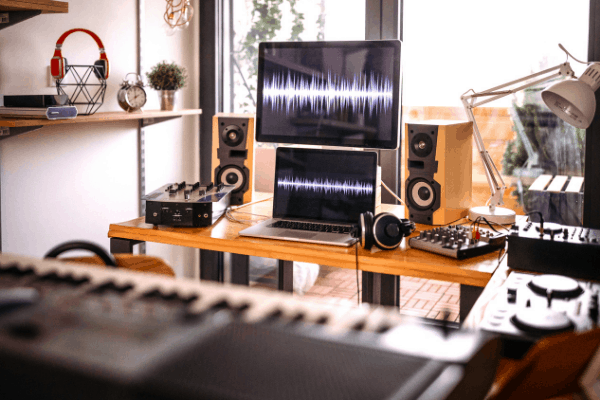Setting up a home studio is a time-consuming and expensive process, but worth it for the home music that you’ll be able to produce. There are several things to consider when putting together your home studio, such as vocal booths, recording equipment, and space; however, what about listening to music? Do you need specific speakers for a home studio?
You do need speakers for a home studio. Generally, the speakers used for recording are high-quality studio monitors, which are more than a way to listen to the music. They are vital for mixing audio and ensuring that the final product is of high quality.
This article will teach you the following:
- More details about speakers.
- How they’re vital to mixing the audio you record in your home studio.
- Why a neutral sound is better for audio production.
- Why mixing with headphones isn’t advisable.
- What kind of studio monitors to purchase.
Let’s get started!

Speakers Are Vital For Home Studios
When you think about recording in a home studio, the first things you think about are the mic, recording equipment, instruments, and sound paneling. Of course, you want a great setup to get the best sound you can, but what you might not consider is how to produce the music once you’ve recorded it.
Speakers aren’t necessary for listening to your recordings, but they are vital to the mixing process.
If you have more than one instrument or voice, you’re going to need to mix the soundtracks for the best balance, which is impossible to do this well without a good set of speakers.
With multiple instrument and vocal tracks, the sound frequencies could get very messy.
They’ll step all over each other and cause the overall sound to be muddy and unclear. In addition, the lead vocals might not be as loud as the instruments, especially if you didn’t use a separate vocal booth and recorded live.
To prevent this and complete the professional sound of your music, you need to mix the tracks. Speakers are vital to this process because, without speakers, you’ll get a colored or distorted sound.
When you play the music over car or radio speakers later, the sound will be uneven. To make music the way you want it, you’ll need speakers.
The kind of speakers necessary for a home studio provides an excellent neutral sound so that you can hear the music as it was recorded and tweak it from there. Speakers also amplify each register in the recording so you can adjust the volume on specific tracks and hear how the differences will sound when you’re finished.
The only home studio situation in which studio speakers might not be necessary is if you only record vocals. With just one track (or two, if you have some pre-mixed background music or a single instrument), you might be able to mix your recordings manually.
However, any more than two tracks and you’ll need good speakers for quality control.
Can I Use Headphones for Mixing?
You might have seen some professional audio recording artists and mixers using headphones to mix their music. While this is possible, it’s tough to do it correctly.
If you’re beginning to record and mix audio, you won’t be able to hear the minor differences in the recordings without home studio speakers.
Mixing on headphones comes after a lot of practice mixing and knowing what you’re listening for. Even with headphones, it’s still necessary to have studio monitors to check the final sound, so you’ll probably still need to buy monitors if you mix with headphones.
I recommend Audeze LCD-1 Audiophile, found on Amazon.com, or headphones of similar quality for mixing. These headphones are some of the highest quality mixing headphones, and you’ll be able to hear details in your songs that other headphones wouldn’t pick up.
Last update on 2025-07-06 / Affiliate links / Images from Amazon Product Advertising API
What Kind of Home Studio Speakers Should You Buy?
When you decide to buy studio speakers, you’ll want to make sure that you get the right kind.
You will need studio monitors and active speakers that are high quality, which will mix well. The better the speaker, the better your music will sound. Although they’re more expensive than regular monitors or speakers, studio monitors are worth the investment.
For a good set of small studio monitors, these Yamaha HS5 Active Powered Studio Monitors, found on Amazon.com, are not too expensive and are of excellent quality. They are small and will fit in any home studio but have a powerful sound. As you continue to improve your home studio, you can upgrade your monitors.
Last update on 2025-07-06 / Affiliate links / Images from Amazon Product Advertising API
Studio Monitors
The most important thing to look at when buying speakers is that they are studio monitors, which were made for recording and mixing in a studio. Buying studio monitors instead of HiFi speakers or stage speakers makes a huge difference in the quality of your mixing for a few reasons.
You’ll Get a Neutral Sound.
Studio monitors provide a neutral sound instead of distorting or coloring the recording.
HiFi stereo systems were made to emphasize the highest and lowest frequencies in music for a more precise sound, which is excellent for listening to music, but not if you’re mixing it. Music mixed on HiFi speakers will sound dead or dull on any other kind of sound system.
Sound Frequency Is Amplified
In addition to a neutral sound, studio monitors can amplify each of the layers of sound frequency individually. Low, mid, and high ranges each have an amplifier. Regular stereo or HiFi speakers have one amplifier for the whole sound, and the complexity of sound on a set of studio monitors makes them worth the investment.
The kind of speakers you mix your audio on will define how your songs come across on other speakers. If you combine on a regular stereo or HiFi set, playing your music on any different kind of monitor will sound flat or dead.
However, music that sounds decent on studio monitors will sound amazing on HiFi speakers.
Power
Power is essential in a studio monitor, in both the amount it’s capable of and the type of power.
The wattage depends on what kind of instruments you are recording. However, the audio peaks can be much higher than the average, which means that the higher wattage you can get, the better. At least 200 watts of power is necessary if you’re recording a full band.
There are three different levels of power in a studio monitor: single, bi, and tri-amp models.
Speakers with three amplifiers are more expensive than those with fewer amplifiers, but they tend to have a cleaner and more defined sound. In addition, more amplifiers make for more neutral feedback, making it easier to mix accurately.
Another difference in monitor power is passive or active power.
Active monitors provide the extra amplification that HiFi and stereo speakers don’t have. All newer studio monitors are built with active power, so you shouldn’t have to worry about checking that. However, if you’re buying a used monitor, it’s essential to check the kind of power it has.
Check out my 7 simple DIY home studio desk ideas.
Extra Features
Of course, there are several extra features available on studio monitors.
Some offer room correction for noisy atmospheres. While this is nice, be aware that it might color your sound. No room equalizers or corrections will be able to best a well-treated room.
If your studio is treated, you won’t need to spend extra money on equalizers.
Monitors come with ported or closed cabinets, and the only difference between the two is how they deal with lower frequencies. Ported cabinets can increase the length of the sound waves for lower frequencies but do it at the expense of some sound clarity.
So for a smaller home studio, closed cabinets might be better.
Check out whether you can produce music on Google Chromebook computers.
Final Thoughts
Speakers are essential for a home studio – without them, mixing the audio is difficult to do correctly. With good studio monitors, you’ll be able to mix your audio until it’s ready for others to hear. Your studio monitors are a necessary component of your home studio and will help you complete your recording and producing setup.
Sources
- Current Sound: Why You Need Studio Monitor Speakers for Mixing
- Neumann: Difference Between Home Stereo Speakers and Studio Monitors
- Home Brew Audio: Studio Monitors – Do You Need Them?
- Sweetwater: Studio Monitors Buying Guide
Recent Posts
QuickTime is a vital app for many Mac users, and if you’ve recently bought a new microphone, you might wonder how to use it optimally. QuickTime cannot record audio content if it doesn’t have...
Every microphone leaves a unique signature on the quality of its output. If you’re a podcaster trying to melt your way into your audience’s hearts, a muddy, distorted recording won’t cut it....


